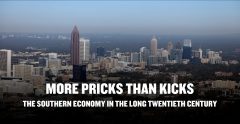Southern Register: Study the South Publishes New Essay

Study the South Publishes New Essay on the Economic South
In this essay, “More Pricks Than Kicks: The Southern Economy in the Long Twentieth Century,” Peter A. Coclanis traces the evolution of the southern economy over the “long twentieth century,” which in his view began around 1865 and is not yet over. During this lengthy period, the economy of the region was shaped—and limited—by factors that originated much earlier with the creation of an economic order based upon racial slavery and export-oriented plantation agriculture. His argument, that is to say, is that it has been very tough for the South to deviate from the “path” taken early in the region’s history. To Coclanis, the region’s difficulties in developing economically are usefully framed in Beckettian terms.
“We are incredibly pleased to publish this illuminating work on the history of the southern economy,” said James G. Thomas, Jr., editor of Study the South. “In this long-form essay, Coclanis exposes how ‘the legacy of plantations and racial slavery have limited the South’s developmental possibilities ever since,’ shedding new light on how the historical problems of the southern past continue to affect the southern present.”
Peter A. Coclanis is Albert R. Newsome Distinguished Professor and Director of the Global Research Institute at the University of North Carolina-Chapel Hill. He works mainly in the areas of economic history, demographic history, and business history, and has published widely, particularly on the US South and on Southeast Asia, including The Shadow of a Dream: Economic Life and Death in the South Carolina Low Country, 1670–1920 (1989); with David L. Carlton, The South, the Nation, and the World: Perspectives on Southern Economic Development (2003); Time’s Arrow, Time’s Cycle: Globalization in Southeast Asia over la Longue Durée (2006); and with Sven Beckert, Barbara Hahn, and Richard Follett, Plantation Kingdom: The American South and Its Global Commodities (2016).
Upcoming essays in Study the South include a “reading” of the National Memorial for Peace and Justice in Montgomery, Alabama, by Margaret Pless, and an extended meditation by GerShun Avilez on labor, mobility, and the precarity of Black citizenship as explored in Douglas Turner Ward’s 1966 experimental play, A Day of Absence.
Click here to read Coclanis’s essay.
——————————————————————————————————
Study the South Seeks New Work
Study the South (www.studythesouth.org) is interested in scholarship that couples the ongoing Covid-19 pandemic with the current national protest movement against racial violence as a lens to examine the past and present culture of the South. Topics for consideration could include but not be limited to healthcare and economic inequality, civil rights and racial violence, and political power and white privilege.
We welcome a variety of thoughtful responses to how we understand, live in, and respond to the changing South. Proposals for essays, curated roundtable conversations, video and photography projects, interviews, activist projects, and pedagogical reflections are welcome.
Contact James G. Thomas, Jr. at jgthomas@olemiss.edu to submit proposals or complete works, or for more information.
Study the South is a peer-reviewed, multimedia, online journal, published and managed by the Center for the Study of Southern Culture at the University of Mississippi. The journal, founded in 2014, exists to encourage interdisciplinary academic thought and discourse on the culture of the American South, particularly in the fields of history, anthropology, sociology, music, literature, documentary studies, gender studies, religion, geography, media studies, race studies, ethnicity, folklife, and art.
——————————————————————————————————
Editor’s Note: As a result of the disruption and cancellation of Center events caused by the COVID-19 pandemic this spring and summer, we have chosen to move the Southern Register to online publication for this Spring-Summer 2020 issue. We’ll return to our usual print publication this upcoming fall, but until then we’ll publish weekly stories that would usually appear in the print edition of the Southern Register. Check the Center website and social media for new “Southern Register Stories” and announcements of upcoming events.

